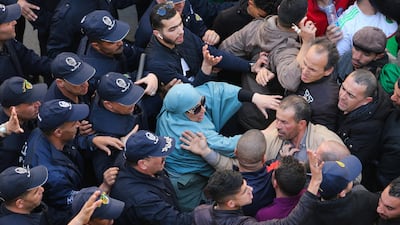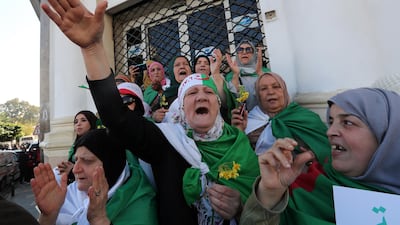With the global pandemic providing some respite from the popular protest movement that challenged its ruling regime, Algeria is moving ahead with constitutional reforms that the government claims meet demonstrators' demands.
On November 1, Algerians will be asked to vote on reforms designed to shift power away from the President and towards the Prime Minister and Parliament. Rebalancing a system heavily biased towards the President, the limit will be returned to two terms with an independent electoral authority and a constitutional court established to serve as a check upon the executive's powers.
Claiming the protesters' silent blessing for the reforms after their passage through Parliament in early September, President Tebboune issued a statement saying, "The proposal is fully in line with the requirements of modern state building and responds to the demands of the popular movement [or Hirak].”
However, for many of the protesters who took to the streets between February 2019 and March 2020, a constitution written by a generation of politicians and their circles falls far short of the Hirak's demands.
"The Algerian people never demanded a new constitution written by the regime," Raouf Farrah, an Algerian activist and member of the political and civic Ibtykar movement said.
"Their claims are straightforward: the departure of the current political regime, and the establishment of the rule of law which guarantees individual and collective liberties, the independence of justice and media. How could we speak about constitutional changes when citizens are jailed, and their fundamental rights, including the freedom of expression, are violated," he said.
For generations, the pouvoir – the opaque circle of officers, trade unionists and political apparatchiks that encircle the Presidency – has sought to mould the terms of the debate and amend the constitution to suit its own ends.
Under former President Abdelaziz Bouteflika, that meant extending the limit on Presidential terms from two to four, keeping the octogenarian incumbent in power for 20 years. Later, faced with a surge in popular anger following Mr Bouteflika's abortive attempt to seek a fifth term in February 2019, the pouvoir again attempted to shift the debate.
As Algerians massed in their hundreds and thousands across the country calling for an end to the graft and nepotism of an inherently corrupt regime, senior members of the government sought to distract with talk of reform and claims that the purge of Mr Bouteflika's inner circle marked the beginning and end of the state's war on corruption.
Even the politicians put forward to succeed the 82-year-old premier were selected from the trusted cadre of inner-circle faces. The victory of Mr Bouteflika's successor, Abdelmadjid Tebboune in an election marred by low turnout last December surprised no one.
Khalil Che, a former protester from the port city of Oran told The National that popular interest in the forthcoming referendum was scant. "It's exactly the same as the election of the President. Like always, the government will try to show that the people are truly excited on television, but that's not the case," he said.
Optimism remains at a premium. Speaking to the New York Times earlier this month, opposition MP Mohcine Belabbas said that the largely leaderless Hirak was clear in what it was against but conceded that "we never succeeded in defining what we were for."
In a televised Presidential address in March, President Tebboune announced the temporary banning of all public gatherings during the pandemic, telling viewers, “The lives of citizens are above all considerations even if this requires restricting some freedoms.”
However, while protesters have generally observed the new restrictions, there is mounting evidence that authorities are using the pause in unrest to stifle any future dissent.
On October 8, Yacine Mabarki an activist with the Hirak, was sentenced to ten years imprisonment and given a fine of 10 million dinar, (USD 77,500) for "inciting atheism", marking the longest sentence handed down to any protester since the demonstrations began in February 2019.
In addition is the growing list of reporters jailed for their support of the Hirak, including the noted independent journalist Khaled Drareni, who is currently serving a two-year sentence for “inciting unarmed assembly and attacking the integrity of the national territory.”
"The staging of the referendum really is a bid for greater legitimacy," Professor Jonathon Hill of Kings College, London, told The National. "By holding a referendum they can claim more transparency and to be more democratic (than their predecessors)."
However, Mr Hill was equally clear that, while protests may have abated, this is a result of the pandemic rather than any government action. Moreover, with Algeria's economy sputtering through a period of low oil and gas prices, popular unrest risks returning in greater strength.
"Algeria has always relied upon a social contract to maintain stability," he said, referring to the state's historic reliance on subsidies from hydrocarbon sales to keep order. "However, with fuel prices low and looking unlikely to recover anytime soon, it's not clear how long they will be able to continue doing that."
Unable to ensure the nation's quiescence, "they may even end up having to consider much more sweeping reforms," he added.
Looking ahead, Mr Farrah believes the protests will return. "The Hirak is a revolutionary process which builds upon decades of struggle for democratic change in Algeria.
"Street protests have indeed been voluntarily suspended, but the Hirak has never really stopped," he said, adding that, as soon as health conditions allow, the Hirak would be back with the same demands as before. “The Hirak is the only solution to overcome the challenging years ahead," he said.
Zayed%20Centre%20for%20Research
%3Cp%3EThe%20Zayed%20Centre%20for%20Research%20is%20a%20partnership%20between%20Great%20Ormond%20Street%20Hospital%2C%20University%20College%20London%20and%20Great%20Ormond%20Street%20Hospital%20Children%E2%80%99s%20Charity%20and%20was%20made%20possible%20thanks%20to%20a%20generous%20%C2%A360%20million%20gift%20in%202014%20from%20Sheikha%20Fatima%20bint%20Mubarak%2C%20Chairwoman%20of%20the%20General%20Women's%20Union%2C%20President%20of%20the%20Supreme%20Council%20for%20Motherhood%20and%20Childhood%2C%20and%20Supreme%20Chairwoman%20of%20the%20Family%20Development%20Foundation.%3C%2Fp%3E%0A
UAE SQUAD
Khalid Essa (Al Ain), Ali Khaseif (Al Jazira), Adel Al Hosani (Sharjah), Mahmoud Khamis (Al Nasr), Yousef Jaber (Shabab Al Ahli Dubai), Khalifa Al Hammadi (Jazira), Salem Rashid (Jazira), Shaheen Abdelrahman (Sharjah), Faris Juma (Al Wahda), Mohammed Shaker (Al Ain), Mohammed Barghash (Wahda), Abdulaziz Haikal (Shabab Al Ahli), Ahmed Barman (Al Ain), Khamis Esmail (Wahda), Khaled Bawazir (Sharjah), Majed Surour (Sharjah), Abdullah Ramadan (Jazira), Mohammed Al Attas (Jazira), Fabio De Lima (Al Wasl), Bandar Al Ahbabi (Al Ain), Khalfan Mubarak (Jazira), Habib Fardan (Nasr), Khalil Ibrahim (Wahda), Ali Mabkhout (Jazira), Ali Saleh (Wasl), Caio (Al Ain), Sebastian Tagliabue (Nasr).
Living in...
This article is part of a guide on where to live in the UAE. Our reporters will profile some of the country’s most desirable districts, provide an estimate of rental prices and introduce you to some of the residents who call each area home.
more from Janine di Giovanni
What's%20in%20my%20pazhamkootan%3F
%3Cp%3E%3Cstrong%3EAdd%3A%3C%2Fstrong%3E%3Cbr%3EParippu%20%E2%80%93%20moong%20dal%20and%20coconut%20curry%3Cbr%3ESambar%20%E2%80%93%20vegetable-infused%20toor%20dal%20curry%3Cbr%3EAviyal%20%E2%80%93%20mixed%20vegetables%20in%20thick%20coconut%20paste%3Cbr%3EThoran%20%E2%80%93%20beans%20and%20other%20dry%20veggies%20with%20spiced%20coconut%3Cbr%3EKhichdi%20%E2%80%93%20lentil%20and%20rice%20porridge%3C%2Fp%3E%0A%3Cp%3E%3Cbr%3E%3Cstrong%3EOptional%3A%3C%2Fstrong%3E%3Cbr%3EKootukari%20%E2%80%93%20stew%20of%20black%20chickpeas%2C%20raw%20banana%2C%20yam%20and%20coconut%20paste%3Cbr%3EOlan%20%E2%80%93%20ash%20gourd%20curry%20with%20coconut%20milk%3Cbr%3EPulissery%20%E2%80%93%20spiced%20buttermilk%20curry%3Cbr%3ERasam%20%E2%80%93%20spice-infused%20soup%20with%20a%20tamarind%20base%3C%2Fp%3E%0A%3Cp%3E%3Cbr%3E%3Cstrong%3EAvoid%3A%3C%2Fstrong%3E%3Cbr%3EPayasam%20%E2%80%93%20sweet%20vermicelli%20kheer%3C%2Fp%3E%0A
Sinopharm vaccine explained
The Sinopharm vaccine was created using techniques that have been around for decades.
“This is an inactivated vaccine. Simply what it means is that the virus is taken, cultured and inactivated," said Dr Nawal Al Kaabi, chair of the UAE's National Covid-19 Clinical Management Committee.
"What is left is a skeleton of the virus so it looks like a virus, but it is not live."
This is then injected into the body.
"The body will recognise it and form antibodies but because it is inactive, we will need more than one dose. The body will not develop immunity with one dose," she said.
"You have to be exposed more than one time to what we call the antigen."
The vaccine should offer protection for at least months, but no one knows how long beyond that.
Dr Al Kaabi said early vaccine volunteers in China were given shots last spring and still have antibodies today.
“Since it is inactivated, it will not last forever," she said.
UAE currency: the story behind the money in your pockets
Company%20profile%20
%3Cp%3E%3Cstrong%3EName%3A%20%3C%2Fstrong%3EYodawy%3Cbr%3E%3Cstrong%3EBased%3A%3C%2Fstrong%3E%20Egypt%3Cbr%3E%3Cstrong%3EFounders%3A%20%3C%2Fstrong%3EKarim%20Khashaba%2C%20Sherief%20El-Feky%20and%20Yasser%20AbdelGawad%3Cstrong%3E%3Cbr%3ESector%3A%20%3C%2Fstrong%3EHealthTech%3Cbr%3E%3Cstrong%3ETotal%20funding%3A%20%3C%2Fstrong%3E%2424.5%20million%3Cbr%3E%3Cstrong%3EInvestors%3A%20%3C%2Fstrong%3EAlgebra%20Ventures%2C%20Global%20Ventures%2C%20MEVP%20and%20Delivery%20Hero%20Ventures%2C%20among%20others%3Cstrong%3E%3Cbr%3ENumber%20of%20employees%3A%3C%2Fstrong%3E%20500%3Cbr%3E%3C%2Fp%3E%0A
VEZEETA PROFILE
Date started: 2012
Founder: Amir Barsoum
Based: Dubai, UAE
Sector: HealthTech / MedTech
Size: 300 employees
Funding: $22.6 million (as of September 2018)
Investors: Technology Development Fund, Silicon Badia, Beco Capital, Vostok New Ventures, Endeavour Catalyst, Crescent Enterprises’ CE-Ventures, Saudi Technology Ventures and IFC
The National Archives, Abu Dhabi
Founded over 50 years ago, the National Archives collects valuable historical material relating to the UAE, and is the oldest and richest archive relating to the Arabian Gulf.
Much of the material can be viewed on line at the Arabian Gulf Digital Archive - https://www.agda.ae/en
RESULTS
Bantamweight:
Zia Mashwani (PAK) bt Chris Corton (PHI)
Super lightweight:
Flavio Serafin (BRA) bt Mohammad Al Khatib (JOR)
Super lightweight:
Dwight Brooks (USA) bt Alex Nacfur (BRA)
Bantamweight:
Tariq Ismail (CAN) bt Jalal Al Daaja (JOR)
Featherweight:
Abdullatip Magomedov (RUS) bt Sulaiman Al Modhyan (KUW)
Middleweight:
Mohammad Fakhreddine (LEB) bt Christofer Silva (BRA)
Middleweight:
Rustam Chsiev (RUS) bt Tarek Suleiman (SYR)
Welterweight:
Khamzat Chimaev (SWE) bt Mzwandile Hlongwa (RSA)
Lightweight:
Alex Martinez (CAN) bt Anas Siraj Mounir (MAR)
Welterweight:
Jarrah Al Selawi (JOR) bt Abdoul Abdouraguimov (FRA)
The%20specs
%3Cp%3E%3Cstrong%3EEngine%3A%20%3C%2Fstrong%3E2.3-litre%204cyl%20turbo%0D%3Cbr%3E%3Cstrong%3EPower%3A%20%3C%2Fstrong%3E299hp%20at%205%2C500rpm%0D%3Cbr%3E%3Cstrong%3ETorque%3A%20%3C%2Fstrong%3E420Nm%20at%202%2C750rpm%0D%3Cbr%3E%3Cstrong%3ETransmission%3A%20%3C%2Fstrong%3E10-speed%20auto%0D%3Cbr%3E%3Cstrong%3EFuel%20consumption%3A%20%3C%2Fstrong%3E12.4L%2F100km%0D%3Cbr%3E%3Cstrong%3EOn%20sale%3A%20%3C%2Fstrong%3ENow%0D%3Cbr%3E%3Cstrong%3EPrice%3A%20%3C%2Fstrong%3EFrom%20Dh157%2C395%20(XLS)%3B%20Dh199%2C395%20(Limited)%3C%2Fp%3E%0A
UK's plans to cut net migration
Under the UK government’s proposals, migrants will have to spend 10 years in the UK before being able to apply for citizenship.
Skilled worker visas will require a university degree, and there will be tighter restrictions on recruitment for jobs with skills shortages.
But what are described as "high-contributing" individuals such as doctors and nurses could be fast-tracked through the system.
Language requirements will be increased for all immigration routes to ensure a higher level of English.
Rules will also be laid out for adult dependants, meaning they will have to demonstrate a basic understanding of the language.
The plans also call for stricter tests for colleges and universities offering places to foreign students and a reduction in the time graduates can remain in the UK after their studies from two years to 18 months.














